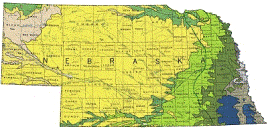United States Geological Survey

United States Geological Survey: Staff Publications
Document Type
Article
Date of this Version
8-1986
Abstract
Plant-sociological and climatic classification of the Australian Nothofagus cunninghamii rain forest provides the basis for a new, semiquantitative approach to interpretations of late-Quaternary paleoclimates from four pollen sequences in southwestern Tasmania. Varying proportions of rain-forest pollen types in the records were related to different modern rain-forest alliances and their specifc climatic regimes, such as Eastern Rain Forest, Leatherwood Rain Forest, and sclerophyllous, Subalpine Rain Forest. According to this interpretation, early Holocene climates were characterized by 1,600 mm annual precipitation and 10°C annual temperature, conditions substantially warmer and drier than previously thought. Maximum precipitation levels of 2,500 mm annually were not reached until 8,000 years B.P. A short-term cooling episode between 6,000 and 5,000 years B.P. led to the establishment of modern rain-forest distribution in western Tasmania, characterized either by a precipitation gradient steeper than before, or by greater climatic variability. To interpret paleoclimates from before 12,000 years B. P., when non-arboreal environments dominated in western Tasmanian bollen records, various modern treeless environments were studied in search for analogs. Contrary to earlier interpretations, late-glacial environments were not alpine tundra with a treeline at modern sea level, but steppe, with marshes or shallow lakes instead of the modern lakes. Climate was characterized by 50% less precipitation than today, resulting in substantial summer droughts. To explain such drastic precipitation decrease, the westerlies that dominate Tasmanian climate today must have been shifted polewards. This suggestion is supported by climate models that take Milankovitch-type insolation differences into account as well as sea-surface temperatures. Paleolimnological information based on diatom analyses support the general paleoclimatic reassessment.


Comments
Published in Palaios, Aug 1986; 1: 368 - 380.